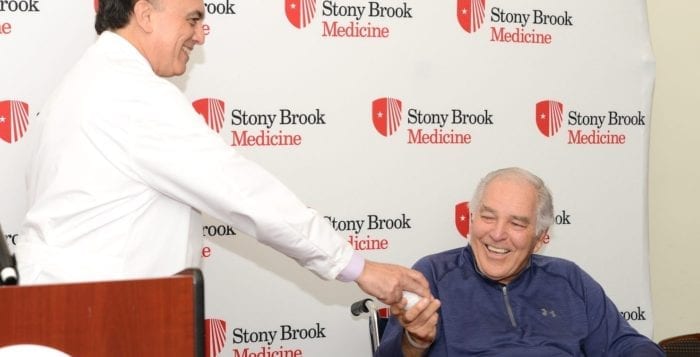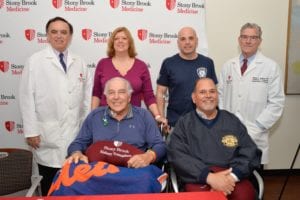Former Mets player grateful for new kidney after SBU hospital procedure

Ed Kranepool has proven once again that miracles do happen, especially when one is part of a team.
The former baseball player, who was a member of the Miracle Mets in 1969, received a new kidney last week at Stony Brook University Hospital thanks to a kidney paired exchange. Kranepool said before the transplant he had two teams — his family, and the Mets organization.

“Now I have an extended team,” he said. “I have our donors here today who certainly without them this program doesn’t exist, and you have to be forever grateful to them.”
Kranepool, 74, received a kidney from Deborah Barbieri, who was hoping to donate a kidney to her husband, but it turned out she wasn’t a match for him due to their different blood types. However, it turned out she was a match with Kranepool. Her husband Al Barbieri received a kidney the same day donated from Port Authority police officer Brian Cooney.
At a May 10 press conference at the hospital, three days after Kranepool, the Barbieris and Cooney underwent their procedures, they joined Dr. Frank Darras, medical director of Transplantation Services, and Dr. Wayne Waltzer, director of Kidney Transplantation Program, to discuss their experiences.
Darras said many with a need for a new kidney are on a waiting list for months or even years. More than 113,000 Americans are waiting for a transplant of some kind, and 80,000 are waiting for a kidney transplant. Out of those 80,000, 8,000 of them live in New York state.
He said many times a family member or friend wants to help a patient, but their blood types don’t match, like in the case of the Barbieris, or the potential donor has health problems of their own. Because of those long odds, he called the donors heroes.
“They do this to help somebody else,” Darras said.
He said Cooney’s altruistic call to the program set the paired exchange chain in motion.
“With that came the reality that we can do a paired exchange, because when he was tested the highest person of his blood type, blood type A, was Mr. Barbieri,” Darras said. “So, then we looked at his wife, who had been a willing donor for a couple of months as blood type AB, which is the most uncommon blood type, and we ran the AB blood list, and Mr. Kranepool was the highest on the AB list with the longest waiting time. So that’s what triggered us to get to this point today.”
The doctor said after the surgery, the remaining kidney of Cooney and Deborah Barbieri would grow and compensate to do 75-80 percent of the work, and there is no significant decrease in life expectancy or increase in kidney failure. He said patients have lived entire lives with a sole kidney, and those who receive one before undergoing dialysis treatments tend to do better. Kranepool was not at the point where he needed dialysis, and Darras said it would have been difficult for him due to high blood pressure and diabetes. A patient on dialysis can gain another five to seven years, while one who receives a new kidney can live another 15 years or more.
Waltzer added there is a discrepancy between those who need a kidney and those who donate. In 2018 there were only 1,619 living donor transplants in the state of New York and 1,047 deceased organ donors. He said the national visibility that Kranepool has given the cause could benefit everyone in need of an organ.
Cooney, 45, a former NYPD officer, said when he responded to Ground Zero after the World Trade Center terrorist attacks Sept. 11, 2001, he witnessed devastation and, in the years that followed, more tragedy as first responders died from 9/11-related diseases. He said he realized how fortunate he is.
“I’d have a blessed life and a blessed career,” Cooney said. “I have very few problems to speak of and nothing to complain about.”
“It’s very difficult to see when you sit there with people who are next to you one day in the chair, and the next day they’re not there.”
— Al Barbieri
It was a few months ago he placed a call to the transplant center, and he said a few days after a visit to the hospital for a general checkup and consultation, he received the call that he was a match for someone.
“Sure enough I was able to set a chain in motion,” he said.
Al Barbieri, a volunteer firefighter in Glenwood Landing since 1982, said he was grateful for all the help in him getting his new kidney. He was placed on dialysis in 2016, four hours at a time, and he has seen many fellow patients lose their battles against kidney disease.
“It’s very difficult to see when you sit there with people who are next to you one day in the chair, and the next day they’re not there,” he said.
At the brink of crying, the organ recipient said he felt fortunate that he could now see his children graduate and be able to go to their weddings and meet his future grandchildren one day.
“Police officers are here in the world today, so firefighters can have heroes too,” he said.
Deborah Barbieri said that dialysis had made it difficult for the couple to go places, especially on vacation, something both of them are looking forward to doing once again.
“I decided to take a shot and go on the list, and it’s the best thing I ever did,” she said.
Kranepool said he felt fortunate to have Deborah Barbieri and Cooney step forward, and he wants to see the same happen for others by continuing to raise awareness. Last year, the former Mets player held press conferences around Long Island to urge residents to sign organ donation forms, and he said he plans to continue spreading the word about the importance of organ donations.
“You get that call,” he said. “I mean, they saved your life.”
This summer, Kranepool said he’s looking forward to spending time in the Hamptons with his wife, and also celebrating in the 50th anniversary of the Miracle Mets in June.
On the day he received the call that there was a donor for him, Kranepool said he had just finished telling his wife to stay positive about his situation. Then 10 minutes later the phone rang.
“It was like magic,” he said. “Something really happened right there.”






